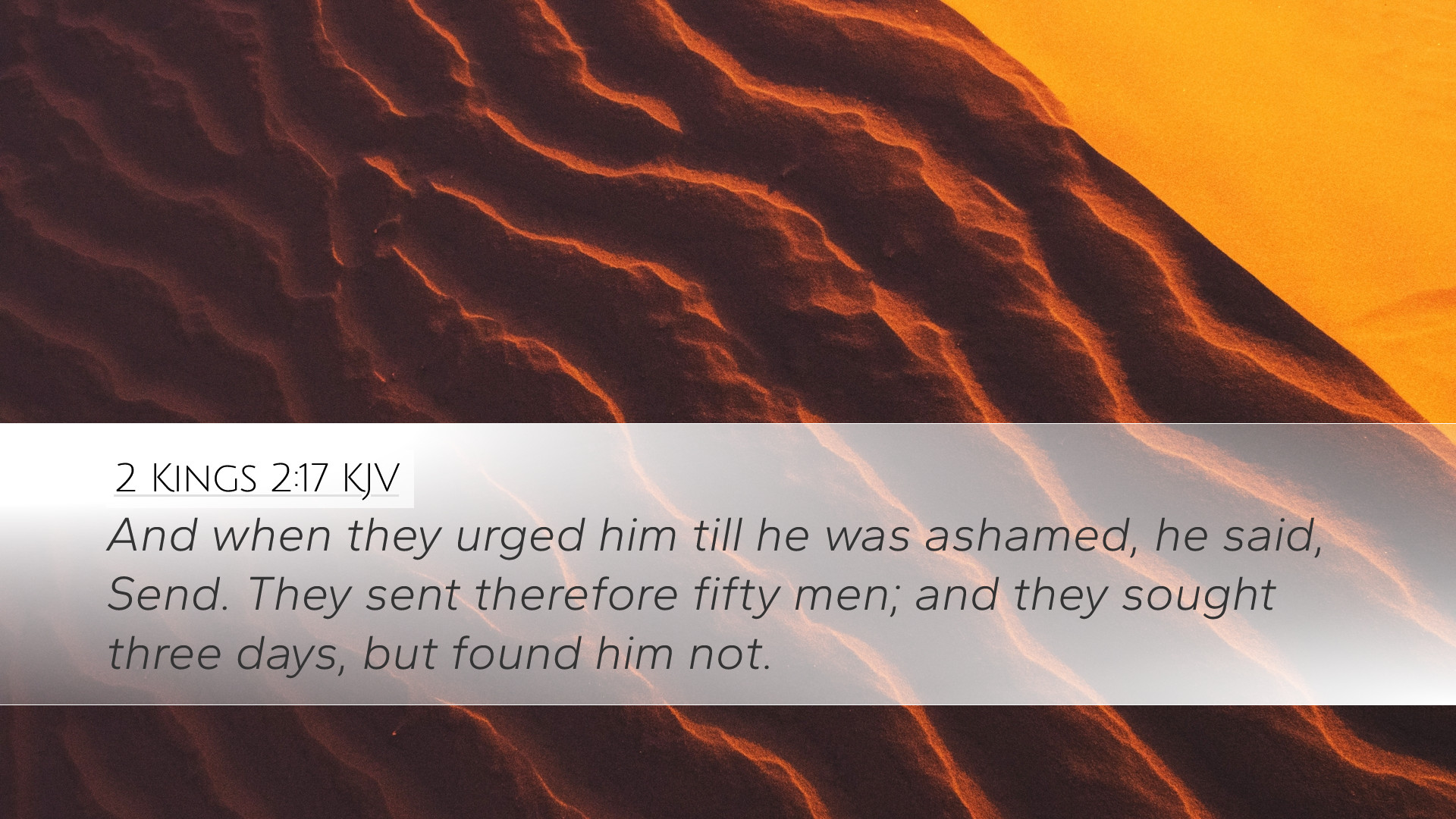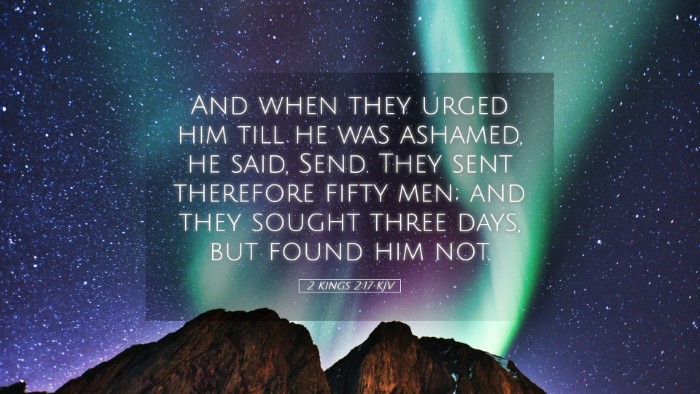Commentary on 2 Kings 2:17
Verse: "And when they urged him till he was ashamed, he said, Send." - 2 Kings 2:17 (KJV)
Introduction
The narrative surrounding 2 Kings 2:17 serves as a poignant episode in the ministry of Elisha following his mentor, Elijah. This verse encapsulates themes of divine authority, prophetic succession, and the complexities of human persuasion in the context of God's will. Through examining this text, we glean insights into the dynamics of faith, obedience, and the prophetic office as interpreted by respected public domain commentaries.
Contextual Overview
Following the miraculous ascension of Elijah, Elisha is faced with the challenge of leading a group of prophets who are anxious to find their beloved master. Their insistence that Elisha send men to seek Elijah reflects a deep concern and emotional investment in the prophetic legacy. This passage, therefore, is not simply about searching for Elijah, but about recognizing the work of God amidst human doubt and yearning.
The Urging of the Prophets
The prophets’ insistence on finding Elijah can be interpreted as a case of human impatience and a lack of understanding of God’s sovereign plan. Matthew Henry comments on the tendency of men to doubt God's methods and timings, noting that the prophets "were over-eager" and manifested a "great deal of anxiety" in their search for Elijah.
Human Persuasion vs Divine Will: The phrase "till he was ashamed" indicates a struggle within Elisha between his confidence in God's purposes and the pressure exerted by those around him. Albert Barnes observes that this reflects a disturbing human tendency to override divine wisdom through persistent human pleas. Elisha's eventual compliance shows the tension between steadfast faith and communal pressure.
Elisha’s Response
Elisha’s eventual decision to send the men reflects a complex interplay of compliance and prophetic clarity. Adam Clarke notes that Elisha’s hesitance illustrates the challenge leaders often face when confronted with the doubts and concerns of those they guide.
Faith in Action: Elisha's response, though appearing initially reluctant, demonstrates a profound faith in God’s providence despite human fears. His dispatch of the men implies a readiness to affirm God’s ongoing work in the world, even when circumstances seem bleak. It is a reminder for leaders today to act in faith, balancing communal concerns with divine assurance.
The Role of Prophetic Leadership
The episode underscores the significance of prophetic leadership in Israel’s history. As Elisha steps into Elijah's shoes, he represents continuity in divine service. Matthew Henry notes, "It was with great reluctance that he yielded," signifying that true leadership often involves wrestling with competing emotions and pressures.
- Faithfulness: Elisha exemplifies faithfulness to his calling amidst uncertainty.
- Community Engagement: He demonstrates pastoral sensitivity, recognizing the prophets' genuine concern.
Theological Implications
Divine Sovereignty: The narrative reaffirms God’s sovereign hand in the transition of prophetic leadership. Elisha, though initially reluctant, ultimately trusts in God’s plan even when he cannot see it clearly.
Collective Discernment: The need for collective discernment in faith matters is highlighted. The community's persistence shows the importance of seeking clarity collectively rather than in isolation.
Practical Applications
The verse encourages pastors, students, and scholars to reflect on their own responses to communal pressures in their ministries. How do we discern when to stand firm in faith versus when to engage with the concerns of our communities?
- Trusting God: Encourage a posture of trust in God’s timing, teaching congregations to lean into faith rather than fear.
- Understanding Anxiety: Address anxieties within the congregation with careful pastoral care, reflecting Elisha’s understanding of the prophets' fear.
Conclusion
2 Kings 2:17 is rich with insights for leadership, community dynamics, and personal faith journeys. In embracing both caution and action, Elisha exemplifies the dual call of a prophet: to listen intently to God while shepherding a community with compassion and discernment. The commentary from esteemed theologians provides a framework for understanding the broader implications of this historical narrative, equipping modern readers to navigate their own spiritual and communal challenges.


